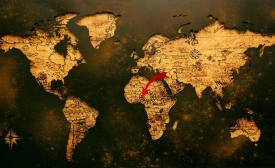violent extremism

President Trump has declared terrorism defeated in Syria and Iraq, but CVE efforts increasingly need more attention in central Africa.
An innovative partnership between the leading private media group in the Middle East and top television writers and showrunners from the United States is taking a different approach: tackling the war of narratives. It might sound strange, or even frivolous, in the midst of an all-out war against the Islamic State in both Syria and Iraq. But, in fact, it makes perfect sense, given the cultural, ideological nature of the larger battle against extremism.

Watch our Facebook Live video on public diplomacy strategies in conflict environments.
Many people of the region today believe that the ISIS communication approach is so slick, so technological, so modern that it cannot be the work of jihadists recruited in the hinterlands of poor Muslim countries alone. There is surely something big and sophisticated behind it, with an objective in mind: kick Islamism where it hurts the most: religious credibility.
Social media heavyweights like Facebook and YouTube have been working with the U.S. government and other international partners as they look to take a more active role in combating terrorist propaganda and other extremist messages that have gained traction online. Officials from the popular social network and YouTube parent Google addressed the issue here at a recent tech policy conference.
From a digital perspective, 2016 has arguably been the year of emotions running high [...] The fact that people are emotional beings is hardly a secret, of course, especially when tragedies or high-stakes political affairs are involved. What digital platforms have brought to the table is a rather new form of commodification of human emotions as instruments of social exchange.
Kuwait said yesterday it is imperative to confront terrorism by promoting Islamic cultural heritage in order to debunk stereotypes about the religion of Islam. [...] He expressed belief that response to extremism and terrorism should proceed from promoting Islamic cultural heritage as well as establishing the concepts of amity, tolerance and fraternity.







